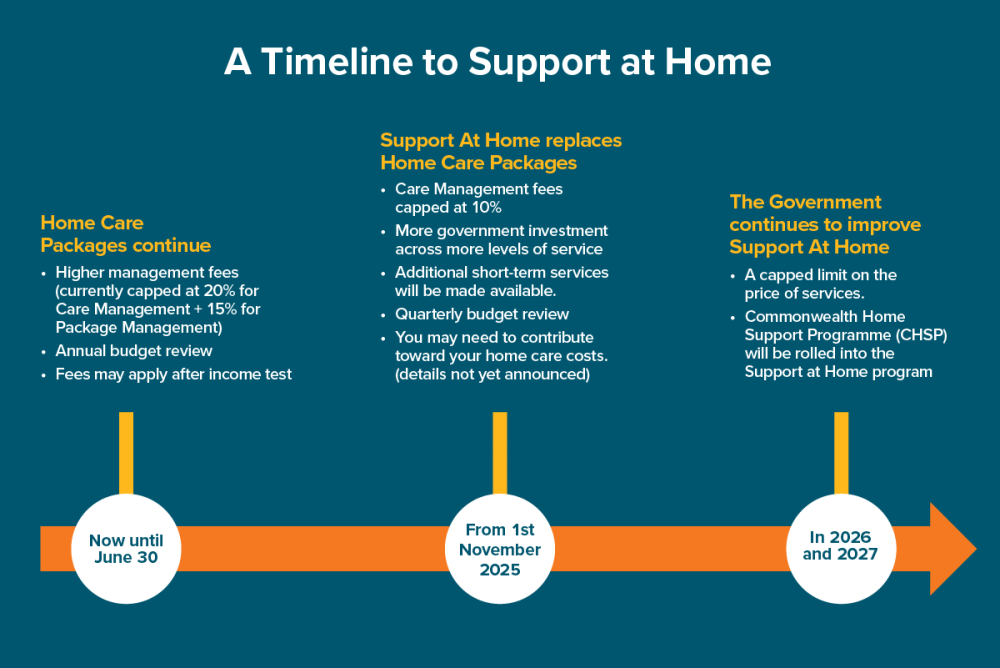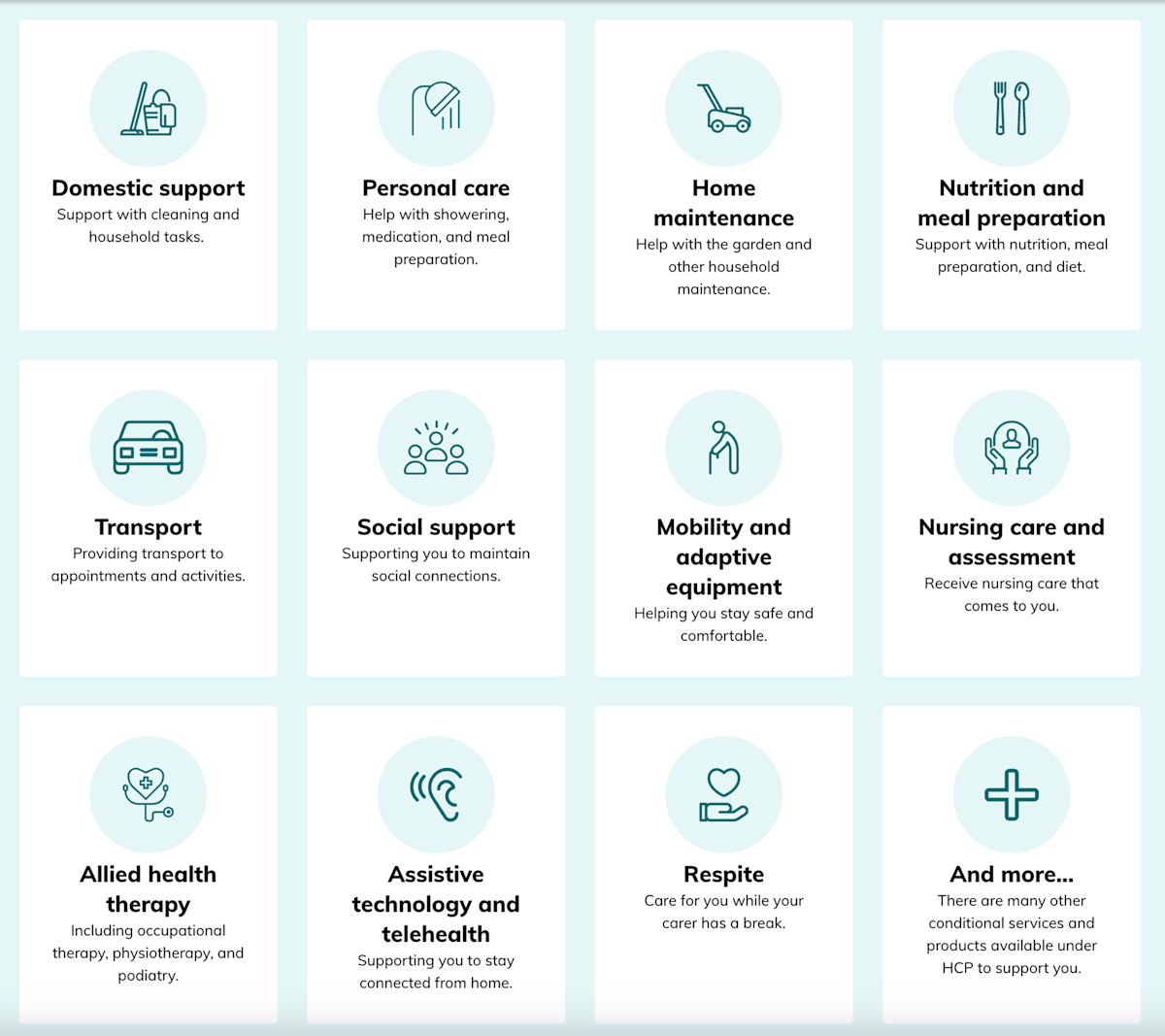Designing a smart care plan with home care package providers
Wiki Article
The Relevance of Home Treatment in Special Needs Support: Discovering NDIS Registered Solutions
Home care is an essential element of special needs support, specifically within the structure of NDIS registered options. It gives essential solutions that foster freedom and enhance general quality of life for individuals with disabilities. By providing individualized help, these services deal with distinct requirements and choices. The performance of home care relies on continuous communication with NDIS coordinators. This dynamic relationship discloses deeper insights right into the transformative capacity of customized support. What obstacles and successes arise in this developing landscape?Understanding the Function of Home Treatment in Disability Assistance
Home treatment plays a necessary function in the support of people with handicaps, supplying significant solutions that advertise self-reliance and enhance top quality of life. It incorporates an array of support customized to fulfill the distinct demands of each person, including individual care, family jobs, and movement support. Educated caregivers use companionship and emotional support, cultivating meaningful links that combat social isolation.Furthermore, home care services are designed to adjust as conditions change, guaranteeing that individuals receive the suitable degree of care throughout their lives. This flexibility permits the integration of new therapies or technologies that may arise. By focusing on the person's routines and choices, home care empowers them to preserve control over their daily activities. Ultimately, the function of home care in handicap support is crucial, as it not just gives useful assistance however also affirms the dignity and autonomy of those it serves.
Benefits of Personalized Assistance in the house
Customized support at home deals various advantages tailored to specific requirements - home care package providers. By producing tailored support plans, caregivers can significantly boost the freedom of individuals with disabilities. This technique not only advertises freedom yet also fosters a sense of dignity and self-regardTailored Support Plans
Customized support plans play an important function in enhancing the lifestyle for people with handicaps. These individualized plans are made to address the special demands and choices of each individual, guaranteeing that support solutions align with their details objectives and way of living. By entailing customers in the preparation process, customized assistance plans foster a feeling of ownership and empowerment. This individualized strategy permits caregivers to provide relevant aid, whether it entails daily living activities, social involvement, or ability development. Additionally, customized plans can adjust to changing scenarios, reflecting the progressing needs of the individual. Ultimately, this personalized support boosts not just day-to-day operating however likewise psychological well-being, reinforcing the significance of a personalized approach in disability assistance solutions.Boosted Freedom Opportunities
People with disabilities benefit greatly from personalized aid at home, as it advertises boosted self-reliance opportunities. Customized assistance permits individuals to engage in everyday activities with better confidence and autonomy. Home treatment solutions can consist of help with personal treatment, meal prep work, and household monitoring, making it possible for customers to keep their preferences and regimens. This individualized strategy promotes a feeling of control, equipping people to choose that mirror their one-of-a-kind needs and objectives. In addition, the convenience of home produces a familiar environment, decreasing anxiousness and boosting emotional health. Generally, customized help not only sustains essential everyday tasks but likewise cultivates a much more independent way of life, allowing people with specials needs to thrive within their communities and attain higher individual fulfillment.Review of NDIS Registered Home Treatment Services
NDIS registered home care services include various kinds of assistance tailored to people with disabilities (support at home). Recognizing qualification and access to these services is crucial for maximizing the benefits of NDIS support. This summary will certainly highlight the vital elements of home treatment under the NDIS structureTypes of Home Treatment
Home care services play a vital duty in supporting individuals with specials needs, supplying a series of alternatives to fulfill varied demands. NDIS registered home care services consist of individual care, which helps individuals with daily activities like showering and dressing. Residential support assists keep a clean and risk-free living environment, while break treatment provides momentary relief for key caretakers. Community access services enable involvement in social and entertainment tasks, cultivating independence and connection. Furthermore, nursing care provides clinical assistance in the house, making sure health requirements are satisfied. Therapy services, including work-related and physiotherapy, aid in rehab and ability advancement. Together, these different kinds of home treatment add greatly to improving the lifestyle for individuals with handicaps.Eligibility and Accessibility
How can one access the important home care solutions supplied under the NDIS? To get approved for these solutions, individuals must satisfy specific eligibility standards detailed by the National Impairment Insurance Policy Scheme. Candidates must demonstrate a significant and irreversible special needs that influences their everyday functioning. The process starts with sending a Gain access to Demand Type, that includes paperwork of the special needs and its influence on day-to-day live. When authorized, individuals get a tailored plan outlining their called for supports, including home treatment services. These services can be accessed with NDIS-registered providers, that have to abide by rigorous quality and security requirements. Comprehending these steps assurances people can successfully browse the NDIS system to obtain the necessary assistance for their home care demands.Benefits of NDIS Support
Accessing essential assistance via signed up services uses people with specials needs a transformative chance to enhance their quality of life. NDIS signed up home care solutions offer tailored support, making certain that each individual's distinct needs are met. These services encompass a wide variety of assistances, including personal treatment, wheelchair support, and restorative solutions, all made to promote self-reliance and well-being. In addition, signed up providers abide by rigorous top quality requirements, ensuring a high degree of care and safety and security. Individuals also benefit from enhanced flexibility, permitting them to select solution distribution approaches that finest fit their way of livings. Ultimately, NDIS support fosters a feeling of neighborhood and empowerment, making it possible for individuals with impairments to involve more completely in their every day lives and accomplish personal objectives.Tailoring Assistance to Specific Needs
Tailoring support to specific demands is vital in handicap treatment, as each individual's preferences and conditions vary substantially. The National Disability Insurance System (NDIS) Go Here highlights the value of individualized care strategies that show the special objectives and demands of each participant. This method permits caregivers to concentrate on details locations such as movement assistance, daily living skills, and emotional support, ensuring that services are pertinent and reliable.
Enhancing High Quality of Life Via Home Treatment
While lots of individuals with specials needs deal with distinct difficulties, home care services can significantly enhance their quality of life by providing tailored assistance in familiar surroundings. These services promote self-reliance, allowing people to engage in daily activities that advertise self-confidence and personal gratification. Through personalized treatment plans, home care carriers can address specific needs, whether it involves support with individual hygiene, dish prep work, or medication management.Moreover, home care assists in social interactions, urging connections with family and close friends, which are essential for emotional well-being. By staying in their own homes, people experience a sense of stability and continuity, decreasing anxiousness connected with unknown atmospheres. In addition, caregivers can offer friendship, helping to alleviate feelings of seclusion. In general, home treatment not just addresses physical requirements yet additionally improves the psychological and social dimensions of life for people with impairments, eventually leading to a more meeting and delightful presence.Browsing the NDIS for Home Treatment Solutions
Directing via the National Handicap Insurance Scheme (NDIS) can considerably influence the efficiency of home treatment solutions for individuals with impairments. Understanding the NDIS framework is essential for participants looking for suitable funding for home treatment solutions. This procedure begins with recognizing individual demands and goals, which assists in tailoring support plans that align with the individual's requirements.Navigating the NDIS includes familiarizing oneself with the eligibility criteria, application treatments, and the planning procedure. Participants need to engage with NDIS coordinators to review their specific circumstances and desired results. This discussion assures that the necessary home care services, such as personal treatment, assistance with day-to-day living, and healing assistance, are included in their plans.Furthermore, remaining updated on NDIS policies and any kind of changes in funding can encourage individuals to make informed options regarding their home care alternatives, eventually boosting their independence and lifestyle.Success Stories: Empowering Lives With Home Care
Home treatment services have transformed the lives of several individuals with impairments, showing the extensive impact of individualized assistance. Sarah, a young woman with cerebral palsy, gained self-reliance through tailored home care support that allowed her to handle day-to-day jobs and get involved in neighborhood activities. John, who has autism, profited from a specialized caretaker who helped him establish social skills and foster meaningful relationships, enhancing his Look At This top quality of life. These success stories highlight exactly how home treatment not only satisfies physical requirements but likewise promotes emotional well-being. Households report enhanced assurance, recognizing their enjoyed ones receive thoughtful and specialist support in a familiar environment. As these examples highlight, home treatment empowers people with handicaps to grow, encouraging self-sufficiency and improving total life contentment. The transformative impacts of such services underscore the significance of home care in the broader context of impairment assistance.
Often Asked Questions
How Can I Find NDIS Registered Home Care Providers in My Area?
To locate NDIS signed up home treatment companies in a details location, individuals can check out the NDIS website, utilize the company finder device, or get in touch with regional special needs assistance organizations for suggestions and advice.What Certifications Should Home Treatment Employees Possess for Special Needs Assistance?
Home treatment workers for handicap assistance need to ideally have credentials such as a Certificate III in Person Assistance, relevant experience, solid interaction abilities, compassion, and understanding of special needs rights and person-centered care methods.Are There Any Kind Of Expenses Connected With NDIS Registered Home Treatment Providers?
Costs connected with NDIS registered home care solutions can vary based on individual needs, service suppliers, and the level of treatment called for. Participants must assess their plans to comprehend specific funding and potential out-of-pocket costs.Can Home Treatment Solutions Accommodate Details Cultural or Language Needs?

How Often Can I Adjustment My Home Treatment Support Strategy?
People can usually transform their home care support plan as required, usually at least each year or upon significant life changes. Regular evaluations guarantee that the strategy remains relevant and successfully addresses progressing personal conditions and demands. Educated caregivers offer companionship and emotional support, cultivating purposeful links that combat social isolation.Furthermore, home treatment services are designed to adjust as conditions alter, making sure that people obtain the suitable degree of care throughout their lives. Home care services can consist of assistance with personal care, dish preparation, and home monitoring, enabling clients to keep their preferences and regimens. NDIS signed up home treatment services consist of individual care, which aids individuals with everyday tasks like showering and clothing. With tailored care plans, home care service providers can attend to certain requirements, whether it includes assistance with personal health, meal preparation, or drug management.Moreover, home treatment facilitates social interactions, urging connections with household and pals, which are essential for emotional wellness. Expenses linked with NDIS signed up home treatment solutions can differ based on individual demands, solution providers, and the level of care called for.Report this wiki page